8+ Sample Event Planning Request for Proposal
-
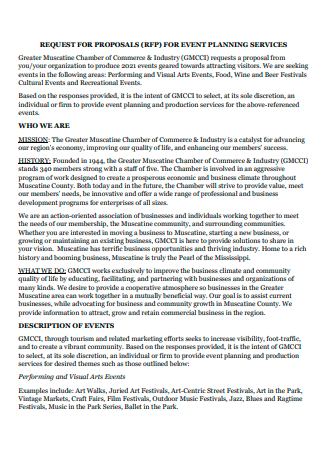
Event Planning Services Request For Proposal
download now -
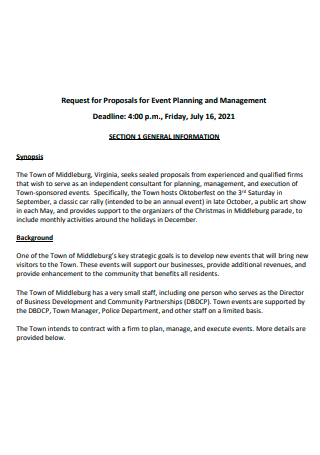
Event Planning and Management Request For Proposal
download now -
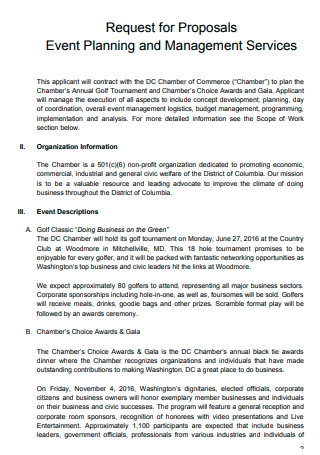
Event Planning and Management Services Request For Proposal
download now -
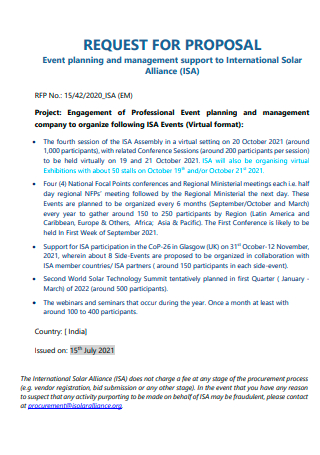
Event Planning and Management Support Request For Proposal
download now -
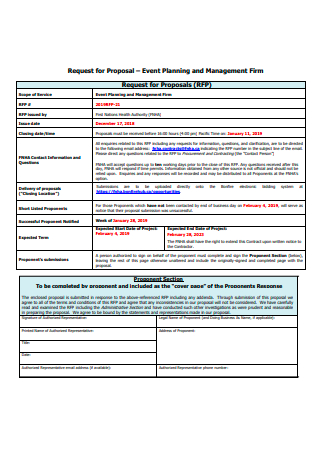
Event Planning and Management Firm Request For Proposal
download now -
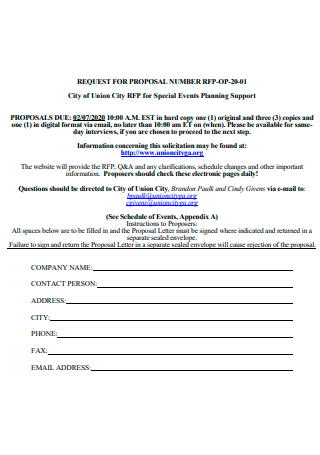
Special Event Planning Support Request For Proposal
download now -
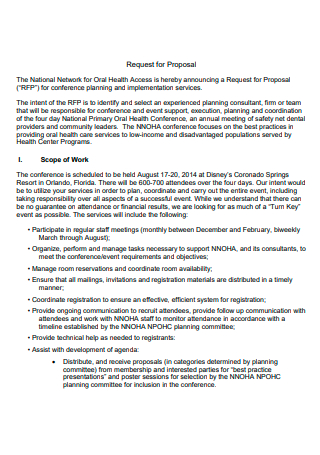
Event Planning Request For Proposal in PDF
download now -
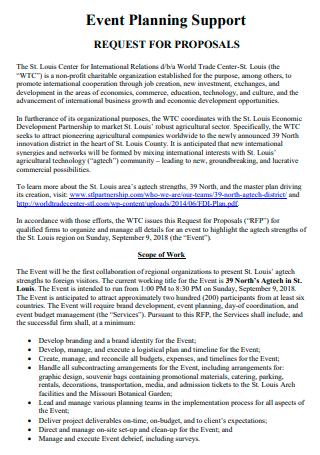
Event Planning Support Request For Proposal
download now -
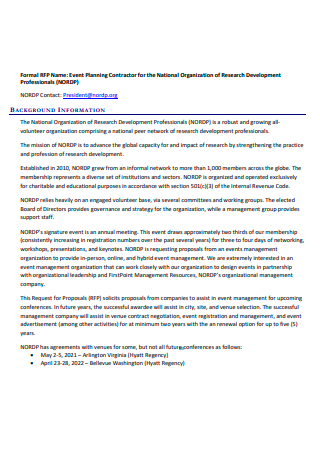
Event Planning Contractor Request For Proposal
download now
FREE Event Planning Request for Proposal s to Download
8+ Sample Event Planning Request for Proposal
What Is an Event Planning Request for Proposal?
The Five Stages of Event Planning
Reminders for Planning an Event
How to Write an Event Planning Request for Proposal
FAQs
What is the format of a request for proposal?
What are the three different types of events?
What is the difference between a request for proposal and a request for information?
What Is an Event Planning Request for Proposal?
A Request For Proposal is a type of document that is sent by a company to potential suppliers. The buyer is interested in service procurement and requests that prospective vendors submit business ideas and likened event planning proposal format as soon as possible. To analyze responses completely and fairly, all of the standards are the same, and viewing the RFP examples can help you. A planner who is interested in the procurement of services like hotel rooms, conference space, and food and beverage creates an RFP in the events industry. Check out the available proposal templates now.
The Five Stages of Event Planning
You risk disarray, chaos, and failure to accomplish the event’s goals if you don’t have a well-thought-out plan for event planning. Your event planning business or one-time event will be a success if you follow a formula. Rather than going into your next event planning job, use this basic guide to the five stages of event planning as a reference. If you have been in the industry for a long time, then these stages will come to you as though it was second nature. But it doesn’t harm anyone to ensure you follow through these stages.
Reminders for Planning an Event
You have gone through the basic stages of planning an event and as a professional, you would be more than open to accepting additional reminders to ensure the success of your event. This is most important to make sure you didn’t forget any other relevant information in planning for the event. Once again, you don’t have to follow each point strictly, there is still an element of freedom since every event is unique in how it turns out.
How to Write an Event Planning Request for Proposal
Now is finally the time for you to begin writing your event planning proposal letter for the event. It is important after all to organize all your thoughts and ideas in one document so that the designated readers won’t be confused with numerous pitches. Go through the guide this article has laid out for you so you can carefully draft each step with precise consent to ensure you don’t forget anything. Proceed to view the event planning proposal example for additional reference.
-
1. Prepare a Company Overview
Take the time to explain to the recipient of your RFP a thorough summary of your company and the event for which you are seeking venues. Ascertain that the vendor is aware of your requirements and why you believe their location is a good fit. Be careful to explain why you are sending out the RFP. Include what worked and what didn’t work in your past sessions in your narrative. Finally, talk about the event’s advantages and disadvantages. Let them know upfront if you have a rather large number of participants but you are working with a flat Budget.
-
2. Define Your Purpose
Tell them exactly what you want from the event host straightforwardly and unambiguously. Explain whether this event is a one-time event, or you prefer to hold this meeting at this location for several years. And if you are thinking of the venue to be included in the meeting rotation, notify them as well. Let them know right away since the prospect of future business might help sweeten the offer even more. Don’t forget to specify the goals of your event. Elaborate on the goals your company is after through a successful event and explain how the venue coincides with that.
-
3. Give a Detailed Event Profile
Make sure to start with your name, as well as the company and event names. Tell them what kind of market category you are in. The sales personnel at the hotel or conference center is typically divided into various categories, allowing the most qualified individual to respond to your inquiry. Let them know the duration of the event, the space requirements, the attendees, or those who will be participating in the event. If you have mentioned it lightly in other sections, this is the part where you should give a more detailed explanation regarding those points.
-
4. Share Budget Guidelines
It’s crucial to communicate your sleeping room fee range as well as whether or not you will be making room arrangements yourself or through the Hotel. Ask for responses that include tax, service costs, and gratuity as part of your entire F&B budget. Additionally, try to get a sense of how much each meal costs per person. Establish pricing lists for the extended venue, parking spots or valet, utility fees, and corkage, if applicable.
-
5. Clarify the Terms and Deadline
When you need the proposal returned, let the hotel and reception center know. Tell them when you will make the first cut and whether or not you will have to give a presentation after that. Let them know if a site inspection will be necessary before you make a final selection, as well as a rough deadline.
FAQs
What is the format of a request for proposal?
A well-written RFP should include: the RFP’s purpose, a detailed summary of the project’s objectives and outcomes, a project timeline that includes a proposal deadline, an evaluation window, a selection date, a date to notify vendors who were not chosen, and a project completion date. Think which fits better as you prepare for an events management proposal.
What are the three different types of events?
There are three categories or types in which events can be classified or known as. These events are classified as private, Corporate, or charitable. It’s best to be aware of the different types as it will help you to write a more comprehensive proposal as you plan the event. The higher-ups will appreciate being aware of the differentiation of each type.
What is the difference between a request for proposal and a request for information?
When the owner wants various contractors to give prospective solutions, a request for information (RFI) is utilized, while a request for proposal (RFP) is used in a bidding process to gather offers for a project. Knowing when to use each document is crucial to determining where the owner stands in the purchasing process.
As an event organizer, it is your task to draft an event business proposal to ensure that the plan you have for the event will be followed smoothly and with little complications. As mentioned, events are unique and the results will differ but the one thing that should be looked forward to is the success at the end of it. Try to see if the events management sample proposal will be of assistance to you.
